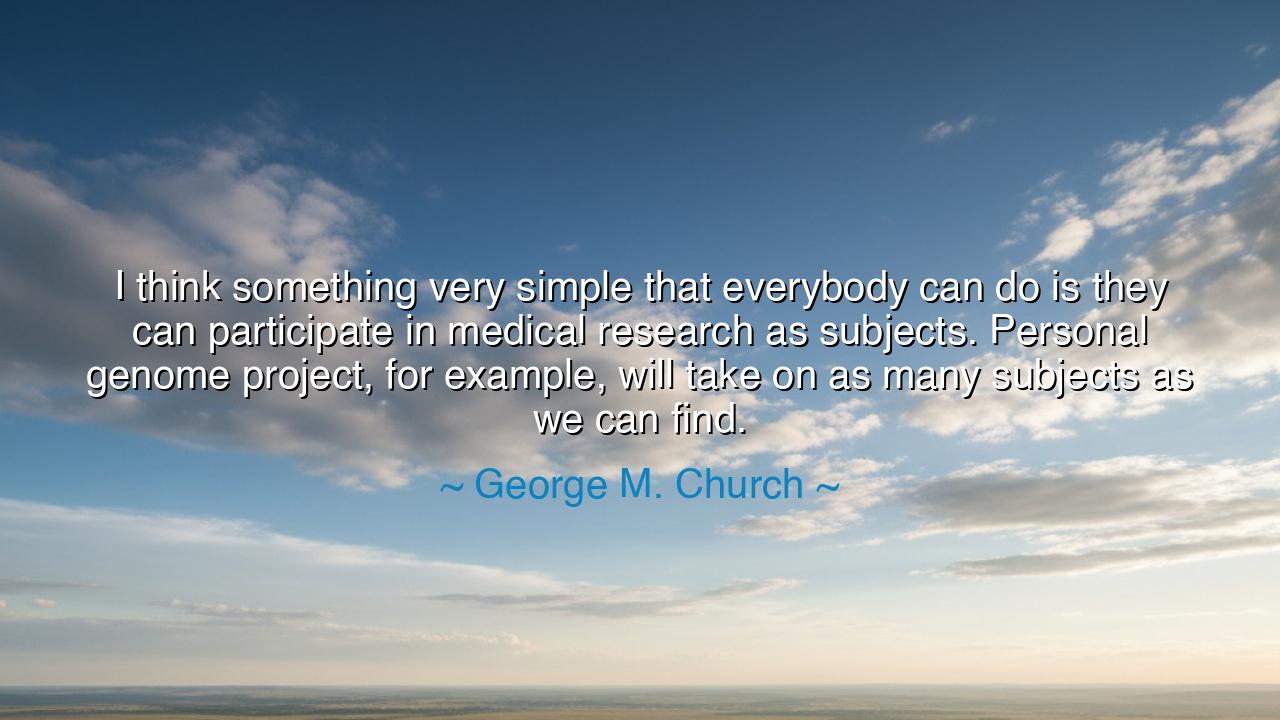
I think something very simple that everybody can do is they can
I think something very simple that everybody can do is they can participate in medical research as subjects. Personal genome project, for example, will take on as many subjects as we can find.






"I think something very simple that everybody can do is they can participate in medical research as subjects. Personal genome project, for example, will take on as many subjects as we can find." — George M. Church
Listen well, seekers of wisdom, for within these words of George M. Church lies not a command of power, but an invitation to purpose. He speaks of a path where every soul, regardless of wealth or station, may become a bearer of progress. He reminds us that medical research — the sacred quest to understand the fabric of life — is not the realm of the few, but the duty of the many. In his vision, each person is both participant and benefactor, each body a book of knowledge written in the script of the genome, that ancient alphabet of creation. To participate in research is to join hands with the generations that will follow — to become a living link in humanity’s chain of discovery.
In the ancient days, healers were wanderers between mystery and miracle. They gazed into the wounds of flesh and the sorrows of spirit, seeking the patterns that connect all life. Yet now, in this age of reason and revelation, we possess a power beyond the ancients’ imagining: the ability to read the genetic code itself, the map of existence etched into our very cells. Church, one of the pioneers of this new dawn, founded the Personal Genome Project, a grand undertaking where thousands have offered their genetic data so that others might live longer, healthier lives. It is a modern temple of shared knowledge — a place where the self is given freely, not in death, but in the service of life.
This quote calls upon us to see that the miracles of science do not spring solely from the genius of a few, but from the courage of the many who lend their stories, their data, their trust. The ancient heroes gave their blood for their people on the battlefield; today, the brave may give their blood in the laboratory, not to destroy, but to heal. For each volunteer who joins a study, each person who shares their genome or medical history, becomes a spark that lights the way for future cures. What may seem a small act — the giving of a sample, the signing of a consent — is in truth an offering to the altar of progress.
There was once a woman, Henrietta Lacks, whose cells — taken without her consent in 1951 — became immortal in the halls of science. Her cells, known as HeLa, multiplied endlessly, helping to create vaccines, unlock the secrets of cancer, and understand the mysteries of the human body. Though her name was forgotten for decades, her gift endures as a testament to what one life can give to the world. Yet Church’s words remind us that the future need not repeat the injustices of the past. We can choose, freely and knowingly, to contribute our part — ethically, transparently, and with respect — so that discovery may walk hand in hand with dignity.
Thus, this teaching speaks of shared responsibility. For too long, humanity has looked to its scientists as saviors and stood idle, awaiting miracles from the minds of others. But wisdom declares: there is no healer without the healed, no discovery without the discovered. The Personal Genome Project was not merely a study; it was a declaration that the future of medicine belongs to all of us. When we participate, we help decode the illnesses that afflict our families, our neighbors, ourselves. We become both student and teacher in the great classroom of humanity.
The lesson, then, is simple yet profound: knowledge grows when shared. The power to cure lies not only in laboratories, but in our willingness to be part of something greater than ourselves. If you are called, participate in a study, donate blood, support ethical science, advocate for open data — these are the offerings of the modern age. Do not let fear or apathy silence you, for even the smallest act may one day echo through centuries, saving countless lives yet unborn.
And so, children of tomorrow, remember this truth: to participate in medical research is not to surrender your body, but to extend your spirit. It is to say, “I will not stand apart from the struggle for knowledge; I will stand within it.” Just as the ancients lit fires to guide travelers through the night, so too must we share our light — our data, our trust, our humanity — to guide science toward compassion. For in giving a fragment of ourselves, we become part of something eternal: the unending journey of humankind to understand, to heal, and to transcend.






AAdministratorAdministrator
Welcome, honored guests. Please leave a comment, we will respond soon